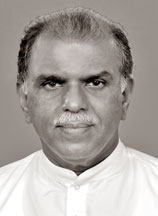Building a regime to counter terrorism
******
Keynote address by External Affairs Deputy Minister Gitanjana
Gunawardena at the regional workshop for Police and Prosecution Officers
in South Asia on “Effectively Countering Terrorism”, Colombo recently
******
|

Deputy Minister
Gitanjana Gunawardena |
The workshop’s theme “Effectively Countering Terrorism” is one in
which the stakes are high for all of us. In Sri Lanka, a year has lapsed
since defeating one of the most ruthless terrorist outfits in the world.
In the aftermath, multi-sector programs to uplift the socio-cultural and
economic standards of all sections of the people are being carried out
with vigour and vision under the Mahinda Chinthanaya policy.
Sri Lanka, as a sovereign state is one of the longstanding members of
the United Nations. It has always played a constructive role in
evolution of the UN system. We are one of the oldest democracies in Asia
and is also one that has maintained an unbroken tradition of democratic
practices to date - building, protecting and maintaining democratic
institutions within its constitutional framework of a unitary state,
with universal franchise practised without interruption since its
introduction as far back as 1931.
Unparalleled
Our success in defeating terrorism has little or no parallels
elsewhere. Objectively we are a repository of experiences of
safeguarding our sovereignty and our democratic institutions and
traditions against three decades of terrorism unleashed by the LTTE.
The LTTE targeted every facet of statehood as well as the safety and
security of all our people and the livelihoods of the widest sections of
society.
Tolerance of diversity of ideas and approaches is important in
building democracy and for social progress. Ours however, is a case
study of how LTTE terrorism worked through intimidation, elimination and
destruction. Dissent was rewarded by the LTTE with death and brutality
which became increasingly horrendous with greater sophistication of
methods and strengthening of its manipulative prowess through inroads to
global power houses and propaganda machineries. Not only a number of our
leaders at national and sub national levels irrespective of race, creed
or religion were systematically eliminated, but also former Indian Prime
Minister Rajiv Gandhi, was ruthlessly assassinated by the LTTE.
Successive Governments, for over three decades, had made several
concerted attempts to engage the LTTE in democratic dialogue through
peace negotiations with international facilitation, intervention and
sometimes interference.
On all such occasions, the LTTE with belligerent mindset of terrorist
militancy brazenly withdrew from the negotiations and continued its
terror campaign with renewed vigour.
|

Crushing terrorism militarily. Picture by Rukmal Gamage |
For the LTTE, every negotiated ceasefire was an opportunity only to
re-arm and regroup to continue with their modus operandi of violence and
terror to divide the country and destroy the much respected sovereignty
of Sri Lanka.
Undivided country
President as promised in his 2005 election manifesto, Mahinda
Rajapaksa upon being elected, embarked on a bold path within his vision
for “an undivided country, a national consensus and an honourable peace”
to free Sri Lanka of terrorism.
He initiated and carried through with strong commitment measures to
end the conflict through a consultative political process, inviting for
all inclusive consultations the political parties represented in
Parliament and those outside the Parliament. The Government peace
negotiators met the LTTE representatives in Geneva in early 2006, with
the LTTE responding with its known tactics of reneging from the
negotiating table and unleashing attacks on military and civilian
targets.
Yet the Armed Forces continued to exercise utmost restraint acting at
all times in conformity with norms of international humanitarian law.
The highly inhumane disruption by the LTTE of water supply to over
15,000 farmers through its blockade of the Mavil Aru in the East
compelled the Government to evict the LTTE from the area by military
means and later proceed to free the Eastern Province from the LTTE
threats. The Province was liberated in 2007 by the Armed Forces within
six months.
Following the success of removal of the LTTE from the East, Our Armed
Forces and the Police launched series of humanitarian operations in the
North amidst attempts at interference by domestic and external forces
and in the midst of hostile weather conditions.
The success of the humanitarian operations which ended nearly 300,000
hostages held by the LTTE as human shields, fleeing for safety to
Government held areas led to the ultimate destruction of the LTTE
terrorist machinery in Sri Lanka.
Thanks to the unwavering political leadership of President Mahinda
Rajapaksa, and the extraordinary commitment and determination,
professionalism and noble sacrifices of our Armed Forces, the Police and
the Civil Defence Department. Not only the people in the North and the
East who had suffered long enough under the clutches of the LTTE, but
also those in the rest of the country are now securely on course to
enjoy the fruits of freedom and to live in dignity with their right to
life and freedom.
To be continued
|



